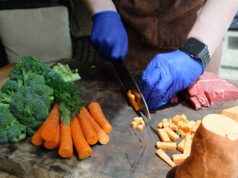
CAPE TOWN, SOUTH AFRICA—The Mount Nelson Hotel in Cape Town became home to thousands of hungry new guests last month with the establishment of an on-site worm farm, or vermiculture, to process leftover food and other organic matter. As well as being a novel new way to dispose of waste, the end-product, called vermicast, is rich in nutrients and will be used by the gardening team as a fertilizer and soil conditioner for the nine-acre garden.
The Mount Nelson’s well fed worms are currently munching on 200 kilograms of scraps from the breakfast buffet and famous afternoon tea—20 percent of the hotel’s usable organic waste. It is hoped that by next year all of the hotel’s organic waste will be processed in this way. Already the worms have started to produce liquid fertilizer for the potted plants in the hotel’s conservatory and lounge.
Each day’s organic waste is separated by the hotel’s night support chef, Samkelo Tumtumana, who delivers it to the farm. The trainee worm farmer, Shaun Gibbons, then feeds the waste to the earthworms, who are housed in a custom designed farm built out of recycled crates.
The hotel developed its worm farm with the help of Mary Murphy, an environmental activist, and Roger Jaques, a botanist, environmental scientist, landscape architect and vermiculturalist. They call their company FullCycle.
“Waste is a huge problem,” Murphy says. “It winds up in landfills and ends up polluting our groundwater and generating greenhouse gases responsible for climate change. “In nature, there is no such thing as waste—the waste products from one organism provide the matter and energy for other organisms. We have ignored this basic principle in the design of our urban spaces.”
“Earthworms are amazing creatures,” Murphy adds. “They are able to process their own weight in food waste every day, turning it into the finest soil conditioner. They do not harbor any bacteria or viruses harmful to humans, and are completely free of parasites. They eat harmful organisms and excrete masses of beneficial organisms in their droppings, known as worm casts.
“They modify their environment by processing and aerating the waste, thereby preventing the decay process from turning ‘bad’—an aerobic decomposition,” Murphy concludes. “This helps prevent the formation of carbon dioxide and methane, and keeps carbon and nitrogen bound in the soil in forms that are available to plants.”
Earthworms are able to convert in a matter of days what would otherwise be a putrid, foul-smelling mass of food waste into earthworm compost. Another product produced by this process is ‘worm tea,’ the liquid that drains from the worm casts and makes an exceptional liquid fertilizer.
Go to Mount Nelson Hotel.






